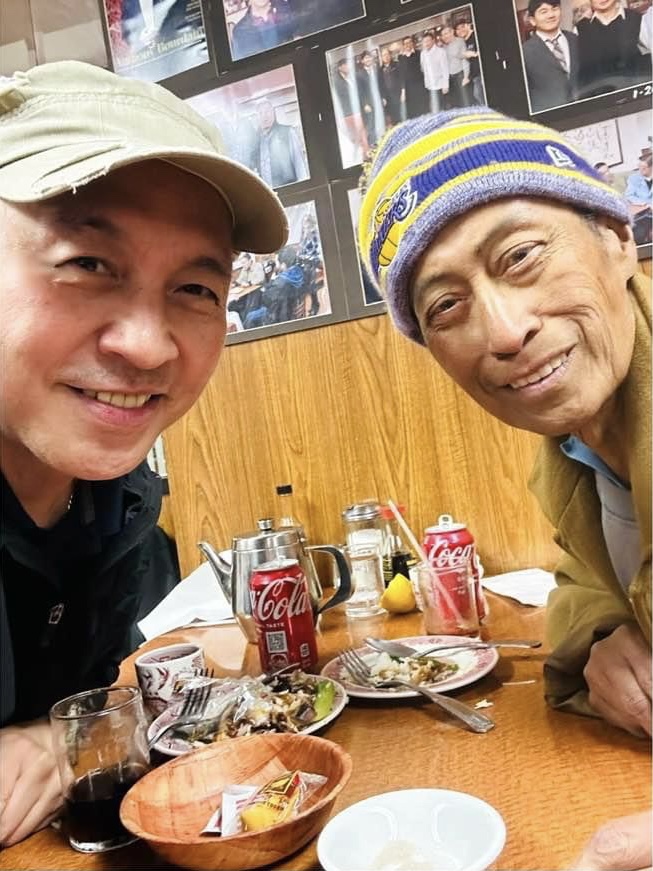“The pain of loneliness seems to be part of the mortal experience. But the Lord in His mercy has made it so that we need never deal with the challenges of mortality alone.”
—Sheri L. Dew
By Alex P. Vidal
UNKNOWN to my visiting friend from Vancouver, Tommy Choy. Jr., I silently grappled to understand my own mortality while listening to his lament he has been struggling with a sleep problem.
Like him, I also struggle to have a good sleep at night. Like him, I suspect my oxygen levels drop when I go to sleep, thus the carbon dioxide levels possibly build up in my blood. I’d be lucky if I dozed off for more than two hours every night.
We’re aware the condition could lead to morning headaches, fatigue and sleepiness during the day, which I have experienced.
But I don’t feel what Tommy feels. I haven’t experienced losing weight drastically. Tom did lose weight—like a featherweight UFC brawler impairing to straw weight; a trace of crimson is visible in the façade.
Tommy, a part time writer for Surrey-based Philippine Asian News Today and a successful realtor, said he doesn’t have worries with his liver and kidneys except for the “little” issues with his heart.
“I need to walk as much as possible even if I sometimes lose my balance. I need to do it slowly unlike before. I need to hold on to something when I take the stairs, if possible. If I fall and hit my head on the ground, it will be my end,” he chortled. “Protect your head, Alex. Don’t fall.”
It’s been four years since we last met, and everything hadn’t changed except Tommy’s physical appearance and honest-to-goodness confession: “I feel weak when I can’t sleep. There are nights that I can hardly sleep, and this has been bothering me a lot. But if I am able to sleep, I’m like a baby.”
Was the septuagenarian from Vancouver envisaging his predestination?
Health issues have slowed down the effervescent Tom, 71, a successful realtor who now dabbles in part time writing and spends his time meeting with friends—old and new— “if I feel okay.”
“Every time I feel weak, I tell the Lord if it’s my time, I’m ready for you,” he quipped.
Tom emphasized: “Sleep is important to us. Our body needs rest. We can do many productive things if we have enough sleep. Our mind can function effectively, and we can think clearly and do our tasks efficiently if we have a good sleep. You should sleep more, Alex.”
Health experts have warned of short-term problems we will encounter if we don’t log enough hours of sleep. These are lack of alertness. Even missing as little as 1.5 hours can have an impact on how we feel; excessive daytime sleepiness. It can make us very sleepy and tired during the day.
Also impaired memory. Lack of sleep can affect our ability to think, remember and process information. Relationship stress. It can make us feel moody and we can become more likely to have conflicts with others.
Also, our quality of life. We may become less likely to participate in normal daily activities or to exercise, and greater likelihood for car accidents. Drowsy driving accounts for thousands of crashes, injuries and fatalities each year, according to the National Highway Traffic Safety Administration.
Tommy wished me luck on my “new life” in New York. He suggested that I “connect only with the right people who can help you with your livelihood and happiness and not waste your time with those who cannot help you and have nothing to do with your passion.”
As a “hard-hitting” journalist, Tommy said I must build my own defense like playing chess. “When the queen falls, you lose the match,” he warned.
“You must focus on your passion as a writer, avoid getting involved in the conflict of others, and keep your faith in God.”
“Also,” Tommy added, “we should avoid salty food or salty sauce. Salt isn’t unhealthy unless we eat too much of it.
Tom warned that too much salt intake can lead to serious health problems when liquid goes down and stays in our legs and stomach.
Doctors said hyperuricemia, an abnormally high level of uric acid in the blood associated especially with the disease gout, happens if too much uric acid stays in our body.
Hyperuricemia reportedly causes uric acid to clump together in sharp crystals. These crystals can settle in our joints and cause gout, a painful form of arthritis. They can also build up in our kidneys and form kidney stones.
According to health authorities, salt and sodium aren’t the same things. Salt is composed of two minerals — about 40 percent sodium and 60 percent chloride. Sodium is what can negatively affect our health if we consume too much.
But our body also needs sodium to survive, health experts said. In small amounts, it helps our nerves and muscles function properly and balances fluid in the body.
According to Dr. Julia Zumpano we need a minimum of 1,500 milligrams of sodium a day. Going below that leads to low blood pressure and electrolyte imbalances in our blood. Signs of too little sodium include: Dizziness. Headache. Lack of energy. Muscle fatigue. Nausea.
We have been warned of the effects of eating too much salt. A sodium-heavy diet makes us retain fluid, which leads to swelling in the short term.
But far more concerning is its impact on our body over time. Zumpano said excess sodium intake can negatively affect our kidney function. It also leads to high blood pressure, the top risk factor for stroke.
“If you only check your blood pressure once a year at your checkup, it could be normal that day,” explained Zumpano. “Perhaps you’ve fasted, had a cup of coffee, peed a lot, and so your blood pressure seems fine. But it might not be so normal if you were tested after eating out at a restaurant.”
(The author, who is now based in New York City, used to be the editor of two daily newspapers in Iloilo.—Ed)





